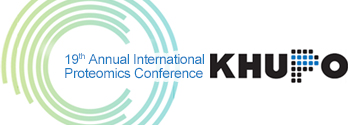Symposia Speakers
Home
> Program > Symposia Speakers > Symposia Speakers
- SYM-1Protein Modification SYM-1 View
- SYM-2Proteins in Pathology SYM-2 View
- SYM-3Biomarkers for Diseases SYM-3 View
- SYM-4Omics Research in Aging SYM-4 View
- SYM-5Clinical Proteomics SYM-5 View
- SYM-6Young Scientists SYM-6 View
- SYM-7Exploring the Unknown Proteins SYM-7 View
- SYM-8Antibody & Biologics SYM-8 View
- SYM-9Multi-omics SYM-9 View
- SYM-10Proteogenomics SYM-10 View
SYM-10 : Proteogenomics

- Code / Date
- SYM10-1 / March 29 (Fri)
- Speaker
- Shinya Ohta CV
- Affiliation
- Kochi University
- Title
- Proteomics analysis of mitotic chromosomes with using nano Random Forest
- Abstract
-

- Code / Date
- SYM10-2 / March 29 (Fri)
- Speaker
- Dongwan Hong CV
- Affiliation
- National Cancer Center
- Title
- Proteogenomic data sharing of National Cancer Center Korea
- Abstract
-

- Code / Date
- SYM10-3 / March 29 (Fri)
- Speaker
- Sang Myung Woo CV
- Affiliation
- National Cancer Center
- Title
- Proteogenomics: the path to precision medicine in cholangiocarcinoma
- Abstract
-

- Code / Date
- SYM10-4 / March 29 (Fri)
- Speaker
- Feng Ge CV
- Affiliation
- University of Chinese Academy of Sciences
- Title
- Proteogenomic Analysis of a Model Diatom
- Abstract
-

Room 404, Nakseongdae R&D Center, 38 Nakseongdae-ro, Gwanak-gu, Seoul, 08790, Korea
Phone: (+82)2–393–8328 E-mail : admin@khupo.org Homepage : http://www.khupo.org
COPYRIGHT ⓒ 2019 KHUPO. ALL RIGHTS RESERVED.
